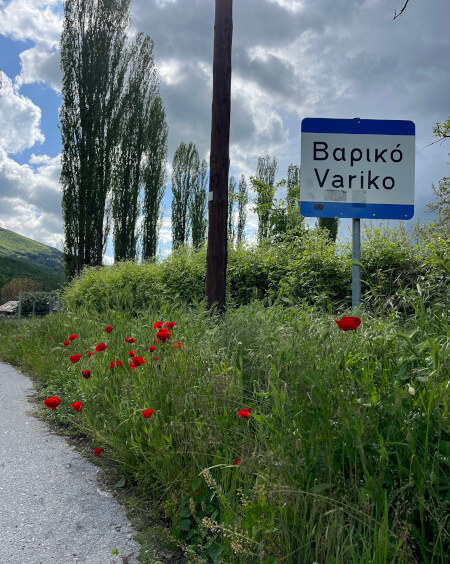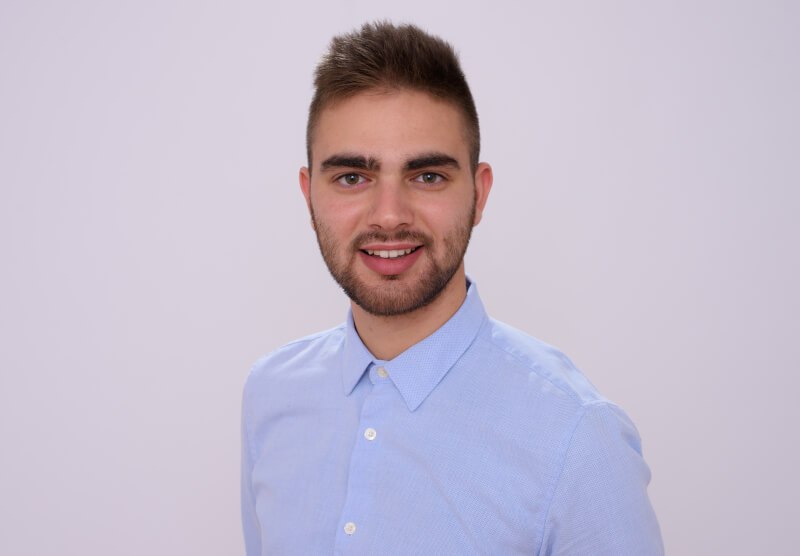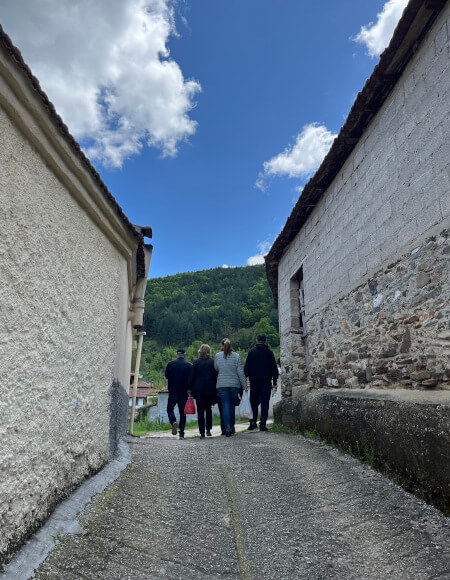 By Mihail Ivanov
By Mihail Ivanov
Mihail Ivanov is a graduate of the 2023 class of the America for Bulgaria Foundation’s Media E:volution program.
When I was a kid, my favorite Sunday pastime was to go for walks with Grandpa in Dobrich’s central park. Grandpa and I chatted about everything: I told him about my friends at school, he told me how he met Grandma, or about his company, or we discussed politics, but mostly his stories were about our family.
Grandpa, whom I was named after, would often take me back to the street where his grandfather’s house was. My great-great-grandfather was a Bulgarian who came over from Greek Macedonia after the end of World War I, moving more than one thousand kilometers as the crow flies to the town of Dobrich [in Northeast Bulgaria, ed.]. We’d often wonder, “What made him come so far north? How did he adapt to his new environment? Did he feel welcome among his fellow Bulgarians?” Grandpa told me about his grandfather’s small restaurant, which was open every day of the year except Christmas. He would wake up at five o’clock every morning to welcome the Bulgarians and Romanians coming from Bucharest and make soup for them. He’d donate any leftovers to the neighborhood’s poor.
The stories about my great-great-grandfather during our Sunday walks became my connection to our ancestral memory, answering questions like, “Who am I? Where do I come from? What is my national or above-national community?” — questions that have always intrigued me. And so, ten years later, thanks to the stories about an individual that neither Grandpa nor I knew personally, we left for Variko, the home village of my great-great-grandfather Dimitar Vaskov, whose decision to migrate had, by virtue of the butterfly effect, shaped both our lives.
The purpose of our family trip to Greece was not to dig up anything specific about Dimitar’s life. Instead, we were looking for an emotional connection to the geographic location. Our expectations changed dramatically when, after hearing us speak in Bulgarian, a couple of elderly women turned to us and asked us in a Bulgarian dialect, “What are you doing here, where are you from?” Their question betrayed their surprise at hearing a language so close to their mother tongue in a region nowadays inhabited mostly by Greeks.
What followed was a story about warmth and hospitality. We were invited to have coffee and homemade bread on the patio of a small house, and we were told about a time when this region was populated mainly by Bulgarians who spoke a language similar to present-day Macedonian. These Bulgarians were chased away by the Greeks coming from the south, and the few that stayed had to stop using their mother tongue and adapt to the times. According to our hosts, Dimitar Vaskov was one of many who were forced to leave their homes far behind in their search for work. We couldn’t find any information about him in the village archive. It burned down, our hosts told us. But no record is as powerful as a community’s living human memory.

After our meeting with the local Bulgarian women, minutes before we were to leave Variko for our hotel, one of them caught up with us, visibly moved. She instructed us to go to Elefteria Mihou’s house; Elefteria was a woman in her mid-forties who had just come back for a couple of days from Munich, where she lived. We were to tell her our story of Dimitar Vaskov.
We knocked on the door. Elefteria invited us in, and her mother started preparing lunch at once. Above the fireplace in their home hung a photo of a young man with a mustache, and I couldn’t take my eyes off it. The man bore a striking resemblance to the man in another photo that Grandpa had shown me prior to one of our Sunday walks. A few minutes after Elefteria heard the story of my great-great-grandfather, she took a sheet of paper and started drawing her family tree, telling us about her grandmother Menka (her Greek name was Melpomeni), whose uncle Dimitar Vaskov had left for Bulgaria. Elefteria also told us about her father, the man in the photo above the fireplace, who for years had craved to find their lost relatives in Bulgaria.
A few seconds of silence followed. Grandpa started crying. And so did Elefteria. A quick check in the municipal records in the regional administrative center confirmed what we had already felt at a much deeper level. We had found our Greek family! Elefteria’s father was Grandpa’s second cousin.
In a matter of seconds, you realize that you share blood with strangers who live more than 1,000 km away from you. You belong to the same family.

Contrary to my expectations, the question of national belonging was suddenly irrelevant. It didn’t matter that Elefteria considered herself Greek, that she had lived in Germany for more than 20 years, and that her origins connected her with Bulgaria, too. We were part of the same ancestral community without even suspecting it. The essence of this encounter is so universal that it makes you think about the hundreds of people, members of one’s extended family and its far-off branches, who have made their lives in different parts of the world. You start wondering about the people you come across in the street: Might they have some connection to you? Do your roots connect you to Italy? Or perhaps even Egypt? You realize that a little part of you probably lives in many places simultaneously. Thus, stereotypes about nation states fall apart because you realize that the people living in those states transcend definitions of nationhood. Political geography ceases to matter. Much more relevant is your connection to the community of humankind. This makes you rethink the work of international organizations trying to solve global challenges led by common values. You start seeing their efforts as a way of jointly caring for relatives known and unknown on every continent. You realize that the world really is a big global village and not only because of the internet but also due to the fact that people’s stories intertwine.
My discovery of family members in the global Variko made me realize how great my responsibility toward my global family is. You don’t need to pay a membership fee to belong to that family, you don’t need to know its distant offshoots, you don’t need to hang out with them or have celebrations together. You just need to accept that you are part of something bigger than the strictly national community and be aware that you are responsible for your actions, which inevitably impact others, too.
When we all act with awareness, our universal human community is powerful enough to create sustainable progress. And sometimes all it takes to gain awareness is showing a child an old house that expands his understanding of home and family.

